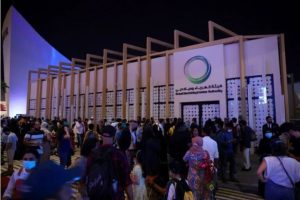Dubai Electricity and Water Authority (Dewa) recorded savings of 329 megawatts (mw) in electricity consumption in the Emirate during Earth Hour 2022, equivalent to a reduction of 132 tonnes of carbon dioxide emissions. These savings are 13 per cent higher than the 291mw savings recorded during Earth Hour 2021. This year’s savings are the biggest since 2008 when Earth Hour was first observed in Dubai.
Dubai residents joined millions worldwide in expressing their solidarity with efforts to reduce climate changes by turning off unnecessary lights and electric appliances during Earth Hour between 8.30pm and 9.30pm on Saturday, March 26, 2022. This year’s Earth Hour was held under the theme ‘Shape Our Future’. Dubai’s landmarks and government and private buildings also took part in the event by turning off their lights for an hour.
Saeed Mohammed Al Tayer, MD & CEO of Dewa, commended everyone who took part in the Earth Hour, emphasising that the goal goes beyond just turning off unnecessary lights and electric appliances for 60 minutes. Earth Hour aims to make electricity and water conservation a daily practice to cut carbon emissions and combat environmental challenges such as climate change and global warming.

“At Dewa, we work in line with the Dubai Clean Energy Strategy 2050 and the Dubai Net Zero Carbon Emissions Strategy, which aims to provide 100 per cent of Dubai’s total power capacity from clean energy sources by 2050. We also raise awareness among society members on the importance of conservation and highlight sustainability practices that positively impact climate action. The results achieved during Earth Hour in Dubai every year underline the key role of society members in conservation and reduction of carbon footprint. The goal of Earth Hour is to encourage society members to adopt a conscious and responsible lifestyle to support national efforts to limit carbon emissions and protect natural resources to ensure their sustainability for generations to come,” said Al Tayer.
Khawla Al Mehairi, executive vice president of Strategy and Government Communications at Dew, said that Earth Hour is one of the most significant environmental initiatives that millions worldwide observe by turning off unnecessary lights, including key landmarks, from 8.30pm–9.30pm on the last Saturday of March. It highlights the importance of strict measures to combat Earth’s challenges, such as climate change and global warming. Dubai was the first Arab city to host Earth Hour activities in 2008.
Dewa’s buildings participated in Earth Hour by turning off unnecessary lights from 8.30pm to 9.30pm. This included Dewa’s pavilion at Expo 2020 Dubai, which also organised various activities, including traditional performances by the Emirati Al Harbiya band. Dewa’s conservation mascots, Noor and Hayat, also participated in the Earth Hour Switch-Off Parade at Expo 2020 Dubai. Additionally, Dewa organised Earth Hour competitions through its social media accounts, with valuable gifts for the participants.